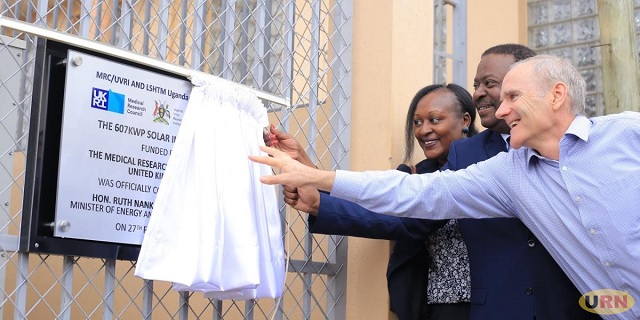
Wakiso, Uganda | THE INDEPENDENT | The Medical Research Council of Uganda/ Uganda Virus Research Institute has secured state-of-the-art solar equipment valued at about 11.5 billion Shillings thanks to the Medical Research Council of the UK and the London School of Hygiene and Tropical Medicine.
The equipment harvests solar energy during the day and stores it on a 930-kilowatt battery that is inter-switchable to get off the national grid when necessary. It is expected that with such an arrangement, the agency will significantly offset its energy bills.
UVRI Executive Director Prof Pontiano Kaleebu says that the project is in line with the United Nations’ sustainable development goals and would, in addition, contribute to the freeing of more resources channelled into research. The project will serve the Entebbe-based main campus plus the Masaka and Kyamuliibwa out-stations.
The world, Kaleebu said was experiencing adverse climate change effects and the energy generated from the project was a climate-smart one, with low carbon emissions. He added it would contribute to the organisation’s journey to reducing 70 per cent of consumption from the national grid whose generation is almost 100 per cent hydro.
Prof Kaleebu, the government’s chief scientist on disease matters explained that the organisation’s work highly depended on energy consumption, including massive refrigeration and other ordinary energy needs that were consuming a substantial part of its budget, a trend they intended to turn around.
The equipment was commissioned on Tuesday by Ministry of Energy and Mineral Development Principal Energy Officer, Eng Elizabeth Kaijuka Okwenje who represented Energy Minister Ruth Nankabirwa.
In her message, the Minister said that the government was committed to promoting the use of solar power as an environmentally friendly solution. She added that UVRI’s adoption of solar as one of the sources addressed innovation and sustainability and was an attestation to the advancement of medical research in Uganda.
The adoption of solar by UVRI, she said was a model trajectory for other government institutions to follow. She said it was a transformative development and an answer to the fluctuating conditions that at times affected continuous energy provision. She added it was in line with the government’s Vision 2040 of holistic development.
The commissioning of the UVRI solar project follows that at the Uganda Fisheries Institute two weeks ago where the institution managers said the power generated would be used to pump water plus light offices and classes and dormitories to offset costs.
Dr Jonas Lexow from the MRC UK said his organization had realized they had done a lot in developing vaccines, therapeutics and other health fields but not much had been done to address climatic change adverse developments that were affecting Mother Earth.
Jonas added that the project was a milestone not just for energy but for health and sustainable development. He said there was more to celebrate as more resources will now be reserved for research purposes than energy costs.
He said he would be happy to report a “robust business case” because prices of other energy sources could not be predicted but “We can be sure that the sun will shine tomorrow.” So far two phases of the project have been executed and the third awaits but officials say at the current stage, fifty per cent of the organisation’s energy expenditure has been offset.
Dr Matt Lee from the London School of Hygiene and Tropical Medicine said that the financing of the project was a fantastic illustration of the organisation’s commitment to addressing climate change to ensure a sustainable future.
Marcos Morales from AZIMUT360, the Spain-based company that executed the project disclosed feasibility studies for the first phase of the project were done in 2020.
********
URN
 The Independent Uganda: You get the Truth we Pay the Price
The Independent Uganda: You get the Truth we Pay the Price



